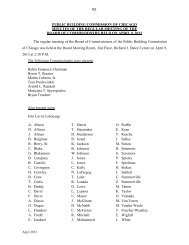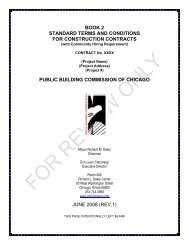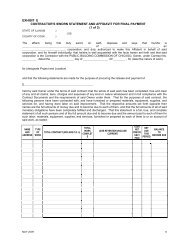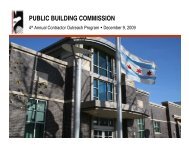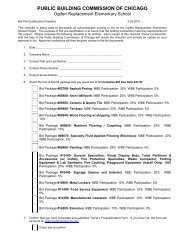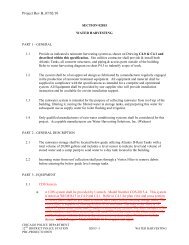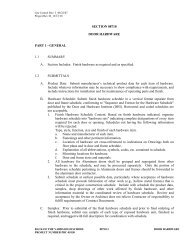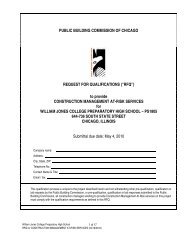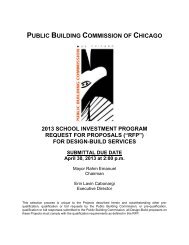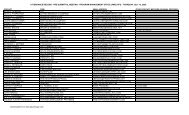Water Reuse Handbook - the Public Building Commission of Chicago
Water Reuse Handbook - the Public Building Commission of Chicago
Water Reuse Handbook - the Public Building Commission of Chicago
Create successful ePaper yourself
Turn your PDF publications into a flip-book with our unique Google optimized e-Paper software.
<strong>Water</strong> <strong>Reuse</strong> <strong>Handbook</strong><br />
Approval Process Currently, greywater systems are not expressly allowed as an<br />
alternative to traditional plumbing systems in <strong>the</strong> Illinois Plumbing<br />
Code (<strong>the</strong> State has jurisdiction over plumbing issues in <strong>Chicago</strong>).<br />
Approval from <strong>the</strong> State must be sought for greywater systems until<br />
such an alternative is legislatively allowed. In addition, <strong>the</strong> City <strong>of</strong><br />
<strong>Chicago</strong> Committee on Standards and Tests must review any systems<br />
that are not currently accepted under <strong>the</strong> <strong>Chicago</strong> <strong>Building</strong> Code. The<br />
approval process should roughly follow <strong>the</strong> flowchart on <strong>the</strong> previous<br />
page until regulations are enacted to approve greywater systems.<br />
1<br />
START:<br />
Greywater<br />
Source<br />
24 : <strong>Public</strong> <strong>Building</strong> <strong>Commission</strong> <strong>of</strong> <strong>Chicago</strong><br />
It should be noted that, due to <strong>the</strong> limited number <strong>of</strong> greywater<br />
systems built to date in <strong>the</strong> State <strong>of</strong> Illinois, <strong>the</strong> permitting process<br />
for such systems may be more involved and time-consuming than<br />
<strong>the</strong> process for rainwater harvesting systems. Additional time should<br />
be budgeted for City and State project review and minor system<br />
redesign.<br />
Several sources <strong>of</strong> water may be appropriate for use in a greywater<br />
system, including used water from showers, lavatories, or washing<br />
machines. Sources do not include water from <strong>the</strong> kitchen sink,<br />
dishwasher, or blackwater (wastewater from toilets and urinals).<br />
Kitchen wastewater and blackwater contain high amounts <strong>of</strong> organic<br />
and inorganic contaminants and bacteria which should be avoided for<br />
greywater systems.<br />
All greywater sources, especially laundry water, should avoid cleaners<br />
that contain harsh chemicals, bleaches, disinfectants, or phosphates.<br />
Ammonia-based cleaners should not be used in washing machines<br />
contributing to a greywater system that uses chlorine purification,<br />
as such cleaners combined with chlorine may form chlorine gas.<br />
Hazardous chemicals should never be put down a drain that<br />
contributes to a greywater system. In addition, washing machines<br />
used as a greywater source should not be used to wash heavily soiled<br />
or human waste-soiled items (i.e. dirty diapers).<br />
Tools and Strategies: Greywater System Design<br />
1 INITIAL<br />
2<br />
FILTER<br />
START<br />
GREYWATER<br />
SOURCE<br />
OVERFLOW TO SEWER<br />
3<br />
FILTER<br />
August 2011<br />
4<br />
PURIFICATION<br />
SYSTEM<br />
DOSIN<br />
LOOP



